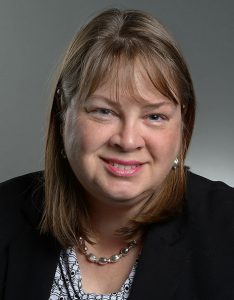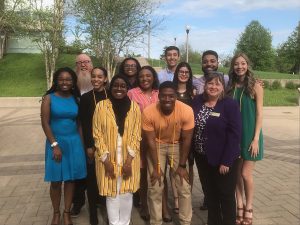
Linda Blockus, director of MU’s Office of Undergraduate Research, was elected to serve on the executive board of the Council of Undergraduate Research.
Linda Blockus practically wrote the book on undergraduate research. Actually, she wrote two: Undergraduate Research Offices & Programs: Models & Practices (CUR, 2012) and Characteristics of Excellence in Undergraduate Research (CUR, 2012). As the founding director of MU’s Office on Undergraduate Research, she regularly shares her knowledge at MU and across the country as a program reviewer, advisor, conference presenter and co-author.
Blockus brings this experience to a three-year term beginning this summer having been elected to the executive board of the Council of Undergraduate Research (CUR), a national organization that supports the high impact educational practice of student-faculty collaborative research and scholarship. It will be her second stint on the board having served from 2009–11, in addition to other duties since joining the organization in 1992.
“My serving on the CUR executive board helps keep MU abreast of best practices and innovations in undergraduate research,” Blockus says. “It also facilitates networking with other undergraduate research directors and faculty from around the country.”
Although scientific research piqued her interest as a young biology major at Dartmouth College, Blockus felt an early pull toward educational leadership and administration. She went on to a master’s in education at Boston University where she also served as an academic administrator in the biology department.
She later found a home at Mizzou working as the first academic advisor in biological sciences and the program manager of the first Howard Hughes Medical Institute undergraduate education grant. She earned her PhD in educational leadership and policy analysis at MU in 2000 and was appointed director of the campus-wide Office of Undergraduate Research when it was established in 2002.

Blockus advises former undergraduate researcher Dante’ Smith, BA ’07, MS ’11, PhD ’18, in 2004. Smith is now a microbiologist with Conagra.
“Dr. Blockus is unrelenting in her commitment to undergraduate research and creative scholarship,” says Jim Spain, vice provost for undergraduate studies. “Her election to the CUR executive board will give Mizzou a voice in the national discussions with program managers, funding agencies and policy groups about how to best support and advance undergraduate research and creative scholarship.”
Under Blockus’s watch, the Office of Undergraduate Research established the Undergraduate Research and Creative Achievements Forum, the Visual Art and Design Showcase, and a research and creative scholarship workshop series — all of which were successfully adapted to virtual formats during the pandemic. The office also helped establish the Freshmen Research in Plants (FRIPS) program which is funded through a collaboration of MU faculty with National Science Foundation grants. More than 90 students have started research careers through FRIPS over the past 11 years, with many entering PhD programs across the country.
“Linda is creative, energetic and student-centered in her approach,” says Janice De Cosmo, associate vice provost at the University of Washington and CUR president from 2019–20. “It is always helpful to have a team member to remind us that our ultimate goal is to improve student learning and success.”

Group of graduating senior pose with Blockus (first row, right) and Brian Booton (back row, left), director of MU’s MARC/IMSD program.
Blockus has a natural gift for facilitating mentorship, fostering student success and making connections — a skillset made abundantly clear at the alumni Zoom panel during April’s Undergraduate Research Week. Mizzou graduates included a scientist in Switzerland advising the World Health Organization, the director of research at the Missouri Orthopaedic Institute and a social scientist tracking human rights violations in the Ukraine.
“I love hearing how enthusiastic they still are about their undergraduate research experience at Mizzou and how excited they are to hear from other alumni,” Blockus says. “It gives me joy when I can connect students to alumni, or alumni to alumni. If someone tells me they are doing a summer program, for example, at the U.S. Food and Drug Administration or Harvard Med — I know someone there.”